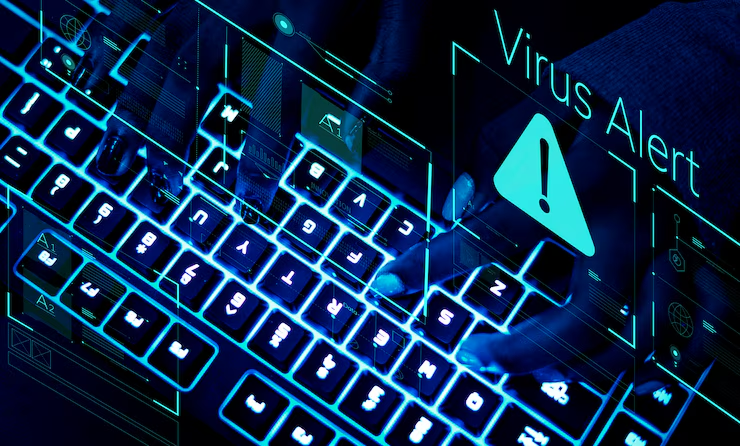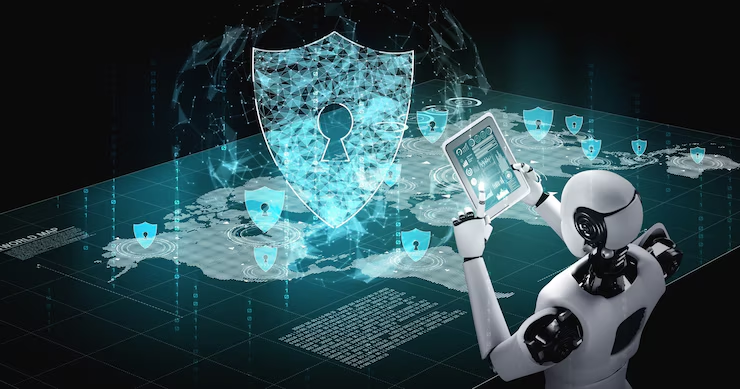Table of Contents
Will AI Take Over Cybersecurity? It is a question being raised these days and is sure to get people thinking. There is no denying how quickly digital attacks are evolving.
Keeping up with their pace using traditional security practices is near impossible. Here comes the rescue: AI can monitor peculiar behaviours and eliminate threats before they inflict damage.
Artificial intelligence is already changing the game. As if that wasn’t enough, can we fully rely on AI? Are we just inviting fresh dangers? Let’s put under the microscope everything that matters.
Exploring The Impact Of AI On Modern Cybersecurity Strategies

What was once merely a buzzword is now quickly turning into the very foundation upon which modern approaches to cybersecurity are built. The days when simple firewalls and even simpler antivirus applications were capable of keeping cybercriminals at bay are long gone.
AI-enabled systems are now capable of assisting security teams during the detection of real-time threats, anticipating breaches, and even automating countermeasures long before any damage is incurred. No sane individual would believe that was possible today, but in fact it is.
AI is truly changing the game, whether it is through machine learning models that track an attacker’s steps or intelligent algorithms that analyse mountains of data in seconds. Such new challenges do arise with great power, however. In what manner is AI continuing to reframe the landscape of modern threats and defences?
Real-Time Threat Detection
Let’s face it: cyber threats are fast-paced. AI can intercept and halt attacks much faster than a human can notice something odd. While login attempts and data usage spikes can easily trigger red flags, only AI can put those warnings into action rapidly and without second thoughts.
AI based tools are able to bypass preemptive hacking attempts as well as alert human members of the team at a split second notice to completely avoid vulnerability exploitation.
Predictive Protection which is Smarter
Hackers can be thwarted even before they attempt to break into a system by analyzing their history. By understanding how past attacks were carried out, AI can make predictions on when, how, and where an attack can be initiated.
Predicting something may not sound exciting but with the right prior knowledge, it becomes effortless. Every target needs a security system not to just stare and halt each subsequent move they make but to expect what comes next and plan accordingly.
Automated Cyber Response
Cyberattacks are becoming more frequent and sophisticated, requiring a faster response. Through AI automation, monitoring infected devices and blocking malicious IP addresses can all happen in real-time without human supervision.
It allows tech teams to devote more effort to devising strategies instead of reacting to fires. Ultimately, AI drastically improves response time and damage control.
Evolve or Be Left Behind
What worked in the past for security will not work in the future; hackers are too smart for that. Employing tactics such as self-created phishing deep fakes takes an intelligent form of AI hacking.
The one advantage is that AI does have the ability to constantly learn, apply new techniques, and analyze new attack vectors. Ultimately, adaptive AI technologies close the hurdle even before it can be crossed.
Also Read: Fake Profile Pictures Exposed: How to Spot Deceptive AI-Generated Faces Like A Pro
Key AI-Based Cybersecurity Risks and Limitations

Everyone loves to rave about AI assisting users with cybersecurity, but let’s face reality. For the most part, it isn’t risk-free. Like any advanced piece of technology, it brings along certain threats and concerns with it. Before we delve deeper into best practices, we might want to explore the disadvantages first.
Insufficient Recognition of Alerts or Notices
AI is designed to notice complexities, but there are instances where it tricks noticing issues. False alerts, which are considered non-issues, can easily become an endless stream for security teams while wasting countless hours of productivity.
On the other hand, poor training of the device might result in missing important alerts that are integrated very deeply within normal activity. This is quite a concerning lack of vision.
Dependency of Data and Bias
The efficiency of AI systems is directly linked to the quality of data they learn from. If the datasets are flawed, outdated, or inherently discriminative, unnecessary bias is bound to creep into the decisions the system makes.
For instance, an AI trained primarily with data pertaining to threats in the financial sector may completely miss a healthcare system-targeted attack. To make matters worse, it may ignore attacks on marginalized groups or regions.
Attacks Focused on AI Vulnerability
The most interesting part is that cybercriminals can focus their attacks on the AI systems themselves. Feeding otherwise classified information using algorithms, attackers can force AI to make decisions such as allowing malicious software entry or overlooking a system breach. This attempt is what is termed as an adversarial attack.
Dependence on Automation
It is helpful for time-saving purposes; however, overdependence on AI to deal with pending tasks is a major issue. some organizations completely drop their manual work increase, believing fully that automation will do everything for them.
Relinquishing control to a self-driving vehicle without monitoring is a fancy way of putting this. Due to the complexity or the novel nature of the issue at hand, AI will always require human supervision.
High Implementation Costs
Setting up and managing an AI cybersecurity system is costly. Businesses have to invest in quality data collection, hire skilled experts, and keep updating the systems. Small and mid-sized businesses may find this investment daunting. Moreover, without the right integration, monitoring, and maintenance, even the best systems may not yield useful results.
Limited Contextual Understanding
AI works at lightning speed but unlike humans, it does not possess an understanding of the broader context. AI does behavioral analysis and flags anomalies, but it cannot interpret AI intentions as humans do.
Sometimes things labelled as suspicious are totally harmless, and sometimes it is the other way around. Not being able to read between the lines or lacking intuition can be a severe handicap in life-or-death situations.
Will AI Take Over Cybersecurity?
There’s no denying that artificial intelligence (AI) is one of the most popular subjects in tech. In particular, one question framed in the context of rising technologies has caught the public’s eye: will cybersecurity professionals be replaced by machines?
With the capacity to analyze boundless amounts of data in a fraction of a second, AI deals immense tasks autonomously. Not to forget, if a cyber threat occurs, AI systems can respond and mitigate the damage without automated coffee breaks.
One noteworthy mention of AI technology is that it “could” bring atomization to flagging hyper suspicious behavior or even responding to straightforward threats, which enables IT experts to address more sophisticated topics. Things that are above the means of elementary reasoning and result-based operations, need fresh and profound analytical skills capable of understanding contexts and background situations.
Last but not least, we cannot omit the fact that AI, just like any other technology, has its flaws. Its faults are a cyber specialist’s field of expertise: it does not grasp nuances, it is easily tricked, makes multiple errors, and fails to comprehend the motivations behind its actions.
Implications on Workforce
- CrowdStrike, a cybersecurity company, stated that they will be reducing 500 positions due to the improved operational efficiencies from AI being adopted.
- AI agents have been implemented by IBM, resulting in the removal of several hundred HR positions. However, other areas of the company are being recruited for, leading to a net increased headcount.
- Engagement with AI remains low, as less than half of employees actively work with the technology.
Conclusion
Ultimately, the issue isn’t whether AI will take over cybersecurity; it’s how they can work together to improve smart defense systems. AI offers rapid deployment and operational scale to business efficiency, while humans add intuition, judgement, and experience to the mix.

Together, they are a formidable force battling cyber threats. So, instead of worrying about a takeover, it’s time to welcome an alliance where AI bolsters the cybersecurity professional’s workload instead of supplanting it.
